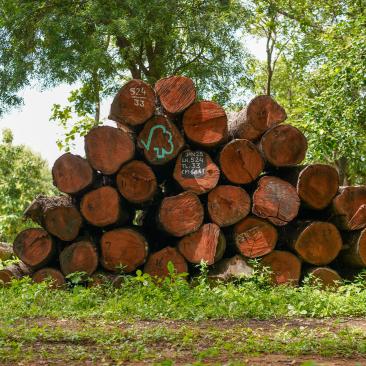
FSC’s rigorous standards enable forest owners, processors, manufacturers, traders, and retailers to adhere to global best practices in sustainable forest management and responsible sourcing. Our efforts help protect forests, uphold the rights of forest inhabitants, and ensure the wellbeing of workers across the forest value chain.
India, with its rich forest resources—including trees outside of forests—and a stringent regulatory framework, provides a conducive environment for the growth of the sustainable forestry sector. With an increasing focus on Environmental, Social, and Governance (ESG) criteria, governments, markets, and consumers are making conscious choices to opt for products that have a minimal impact on natural resources. Currently, 3.7 lakh hectares of natural forests and plantations are certified in India. Additionally, more than 2000 Chain of Custody certificates have been issued to processors, manufacturers, and traders. The presence of the FSC label on forest products fosters brand recognition and credibility, leading to direct access to sustainability-conscious markets and a higher premium for forest products.
Message from FSC India Country Director
At FSC India, we are dedicated to fostering and supporting responsible growth in the forestry sector. We endeavor to achieve this by promoting sustainable management of forest resources and responsible consumption of forest-based products. To fulfil this mission, we engage extensively with forest owners, forest-based industries, associations, sustainability institutions and civil society to advance forest stewardship.
Our primary engagement tools include conducting awareness/capacity building programs, sensitizing potential FM and CoC certification holders, initiating one-on-one dialogues, conducting roundtable meetings and workshops. This process enables us to understand stakeholders’ needs and demonstrate how FSC’s suite of solutions can support their sustainability goals.
I am pleased to inform that FSC India has registered significant increase in CoC certificate holders by more than 250% over last 5 years from 797 to 2056 certifications. Majority of these certifications come from paper & packaging, solid wood, textile, and rubber sectors. Foresty management certification has also shown increasing trend. While these growing numbers are encouraging, we are also cognizant of the challenges ahead. Nevertheless, within these challenges FSC India sees numerous opportunities to capitalize on in the years ahead.
The European Union Deforestation Regulation (EUDR), imposing strict norms on the export of forest products to the EU market, has provided us an opportunity to highlight FSC solutions for traceability, geo-mapping, and risk assessment essential for EUDR compliance. Our rigorous standards with regulatory module and FSC Trace align completely with the EUDR, aiding our forest-based industries (FBIs) in EUDR compliance.
The launch of the Regional Forest Stewardship Standard (RFSS) pilot in 2022 for smallholder plantations less than 20 hectares has facilitated the mainstreaming of smallholders into the certification regime and supports the uptake of group certification in collaboration with forest-based industries. The scope of this standard has now been extended to the natural forests for NTFPs and ecosystem services. Additionally, the Ecosystem Services Procedure 2.0, with its inclusion of cultural services and equality, offers new opportunities for the natural forests owners in India to project the verified impacts of intangible benefits and allows sponsors to meet their ESG and other sustainability commitments.
At FSC India, we are deeply committed to mainstreaming the true value of our forests and support the society communities to work towards forests for all forever. We invite you to join hands with us in this effort by opting for promotion supporting sustainable forest-based products.
~ Dr.Suresh Gairola, FSC India Country Director
FSC Forest Stewardship Standard (FSS) for India
The FSC Principles and Criteria (P&C) for Forest Stewardship provides an internationally recognized standard for responsible forest management. However, any international standard for forest management needs to be adapted at the regional or national level in order to reflect the diverse legal, social and geographical conditions of forests in different parts of the world. India launched its Forest Stewardship Standards (FSS) in the year 2022. This standard is applicable to all forest operations (forest / plantations owner or even a group of forest / plantation owners) within India. Specifically, this standard shall be applied in the following scope:
Geographic region |
India |
Forest types |
All forest types (including natural forests and plantations) |
Ownership types |
All types of ownerships, including public, private and others |
Scale and intensity categories (according to section 6 of FSC-STD-60-002) |
All categories of management units, including small and low intensity managed forests (SLIMFs) (See section F for the applicable SLIMF eligibility criteria for this geographic region) |
Forest products (according to FSC-STD-40-004a) |
Rough Wood NTFPs: Fruits (edible or non-edible); Sap or gland secretion: gum, resin, oils, rubber/latex; Medicinal plants; Leaves, seeds, barks, nuts, roots, grasses, ferns, lichens, flowers, mushrooms; Stem plants: bamboo, rattan. |
FSS can be downloaded from this link: |
|
FSS Hindi version can be downloaded from this link: |
India Regional Forest Stewardship Standard (RFSS) Pilot
Smallholders play an important role in Indian wood industry. Their plantations are generally in the form of agroforestry, farm forestry, block, and strip plantations. However, these smallholders face challenges in FM certification such as technical language of the standards and high cost of audit and compliance. To streamline these issues, FSC has launched RFSS pilot, which is simple, easy to understand and comes with reduced complexity. Smallholders having less than 20 ha can apply individually or in group for FM certification.
RFSS can be downloaded from this link: Document | FSC Connect
RFSS pilot Hindi version: Click here

Chain of Custody Standards
FSC Chain-of-Custody Certification is designed for companies that produce and distribute forest-based products. This includes organizations that do the following.
- Label finished goods as FSC certified.
- Sell FSC-certified products with FSC claims on sales documents.
- Produce semi-finished products using FSC-certified materials (by manufacturing them, by mixing or adding forest materials to them, or by repackaging or relabelling them).
- Promote finished FSC-certified products (except finished and labelled products).
The FSC label on a finished product signals that the materials used during production have met the chain of custody requirements at every step in the supply chain, from sourcing to distribution. The CoC certificate will involve audits of the companies to ensure it has the capacity to maintain an unbroken supply chain.
CoC standard can be downloaded from this link: Document | FSC Connect
FSC solution for retailers
The Forest Stewardship Council (FSC) promotional licence lets retailers, brands, and others use the FSC trademarks to show their commitment to sustainable forestry. It’s designed for companies that are not certified but do sell or use FSC-certified finished and labelled goods.
How to apply for a Promotional license? The general process includes the following steps:
-
Step 1: Start your application.
Your local FSC team (india@fsc.org) will begin by providing you with an application form to fill out.
-
Step 2: Submit supporting documentation.
We’ll advise you on how to provide documentation proving that the products you wish to promote are FSC certified.
-
Step 3: Sign the agreement.
Signing the promotional licence agreement and paying a service fee (where applicable) will give you access to the FSC trademarks and a unique licence code.
-
Step 4: Promote with FSC trademark.
Once you’ve completed the licencing process, you’ll be free to use the FSC trademarks in your promotional materials.
For more details, you may visit our website fsc.org
Certification Bodies
FSC sets the standards for forest management and chain of custody certification and defines the procedures that certification bodies should follow in their certification assessments. To ensure credibility and transparency, FSC does not issue certificates itself. Instead, this role is held by independent certification bodies who carry out the forest management, ecosystem services, ecosystem services, and chain of custody assessments that lead to FSC certification.